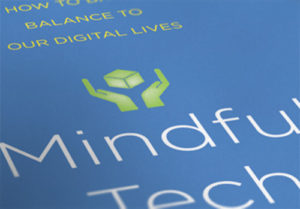 If you climbed a mountain to ask an ancient Zen master about the right approach to Facebook, what would he say?
If you climbed a mountain to ask an ancient Zen master about the right approach to Facebook, what would he say?
I don’t think that David would make a claim to mastery, but Mindful Tech is the closest thing I’ve seen for a Zen response to technology. It’s both fascinating and filled with common sense. Instead of directives on how to respond to email and social media requests, he examines how we relate to it on a daily basis. It was interesting to read this on the heels of Sherry Turkle’s Reclaiming Conversation. In many ways, I think he picks up where she leaves off. There weren’t many prescriptions for how to deal with the technological invasion of our lives in Reclaiming Conversation. While Mindful Tech isn’t a filled with rules and formulas, it is a guidebook for coming to your own conclusions and ideas on a personal level.
Big Thought
These days there seems to be two opposing camps to technology’s effects on us and our society: one that thinks it’s inevitable and awesome, and one that thinks its inevitable and damning. This book is one of the first examples I’ve read that simply says, “Let’s pause for a moment and think this through.” Using awareness and mindfulness, the goal is to find a middle-path that works for the individual.
Ideas, Implications, and Questions
- One of simple (and thus immensely powerful) ideas that I found here is the idea of approaching technology usage as a “craft” (pg 7). For David, that means it requires intention, care, skill, and learning. I think this is where most people get off on the wrong foot. They just dive in to using the latest tools with little forethought. They think, “A toddler can use an Ipad so it should be easy and intuitive.” But playing on a tablet is way different from managing information, focus, and time. That requires strategy and training. Too many people short-change their learning, and struggle in the long-term because of it.
- I often talk about social media as simply a tool for communication. David broadens the scope to consider all technology as neither good or bad, simply a tool. And that means that it can have positive and negative effects based on how it’s used. A great question he submits: “Why shouldn’t the Internet make us smarter in some ways and dumber in others? (pg 171)
- One of the main goals of Zen meditation is “mindfulness”, the focused attention on the present moment. While many people struggle to see the practical effects of mindfulness, David points out that it is a powerful way to be intentional when faced with different options. As he writes, “What mindfulness really is to me is the ability to direct your attention where you want it to go – to have a choice…”. (pg 25) And many of the practices in the book are around creating that mindfulness around technology so that you have a choice. You don’t have to read an email just because it comes in!
- One of the biggest takeaways for me was the idea of pausing to take back control of how we use technology. I think one of our biggest challenges is that we think that technology is in control of our lives, and not us. It’s important to remember who is the master in this relationship, and one of the best ways of doing that is by stopping and observing your thoughts and behaviors. “I believe unplugging can help us discover an appropriate balance between our online and offline activities.” (pg 133)
- This gets to the fundamental desire that people want for agency in their lives. They want to have control. (pg 159) This is the crux of the issue: people don’t feel like they have control over how they spend their time and attention. The more that they can take that control back, the more they can develop a healthy approach to technology in their lives.
- I’m not sure that I buy the approach to multitasking, though. In true Zen fashion, there’s no judgement, and David shares that “attention lies at the heart of the practice that we call multitasking” (pg 32). But this still isn’t multitasking in my mind, because doing two things at once doesn’t really work. We’re just moving our attention around much more quickly. That can be useful when completing a number of tasks that require you to do a little bit of activity and then wait for a response (think of a slow-loading website form). But in general, I agree with the research that shows that multitasking leads to less efficiency and less productivity.
- That doesn’t mean there’s a one-size-fits-all answer. I think that the idea of creating personal guidelines is truly important. This is another of the challenges, because people are in a vicious circle where they want easy answers/rules to manage technology because they don’t have time to think it through themselves… because they are already overwhelmed by technology in their lives. But there can’t be a single way to approach all of these tools, it has to fit within the context of our own individual lives.
Should you read this book? Who should read this book?
I think most people have some questions or concerns about how they interact with technology. Whether you are a student who struggles against the pull of social media or a business person buried under piles of email, this book offers some tools to use to re-orient yourself towards technology. It’s not going to give you the latest system to get to Inbox Zero, but it can put you on the path to peace of mind. And that’s probably a little more valuable.
